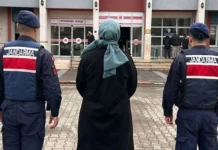Forty people have been detained in an Ankara-based operation that was conducted in six provinces for helping the families of people jailed over alleged links to the Gülen movement, the state-run Anadolu news agency reported.
Local reports earlier revealed how Turkish prosecutors intensified the crackdown on the Gülen movement, a faith-based group accused by the government of “terrorist” activities, following the announcement of a new cabinet by President Recep Tayyip Erdoğan in early June. According to Ali Yerlikaya, new interior minister, Turkish prosecutors have ordered the detention of 748 individuals in the last month.
As part of an investigation launched by the Ankara Chief Public Prosecutor’s Office, police raided the houses of 47 suspects and detained 40 of them, confiscating their cash, jewelry and other belongings.
According to Turkish media reports, they were accused of providing financial support to the families of people who were expelled from public service via decree-laws, who were in prison due to alleged links to the Gülen movement or who were just released.
President Erdoğan has been targeting followers of the Gülen movement, inspired by Turkish Muslim cleric Fethullah Gülen, since the corruption investigations of December 17-25, 2013, which implicated then-prime minister Erdoğan, his family members and his inner circle.
Dismissing the investigations as a Gülenist coup and conspiracy against his government, Erdoğan designated the movement as a terrorist organization and began to target its members. He intensified the crackdown on the movement following an abortive putsch that he accused Gülen of masterminding. Gülen and the movement strongly deny involvement in the coup attempt or any terrorist activity.
Following the coup attempt, the Turkish government declared a state of emergency and carried out a massive purge of state institutions under the pretext of an anti-coup fight. More than 130,000 public servants, including 4,156 judges and prosecutors, as well as 24,706 members of the armed forces, were summarily removed from their jobs for alleged membership in or relationships with “terrorist organizations” by emergency decree-laws subject to neither judicial nor parliamentary scrutiny.
In addition to the thousands who were jailed, scores of other Gülen movement followers had to flee Turkey to avoid the government crackdown.















